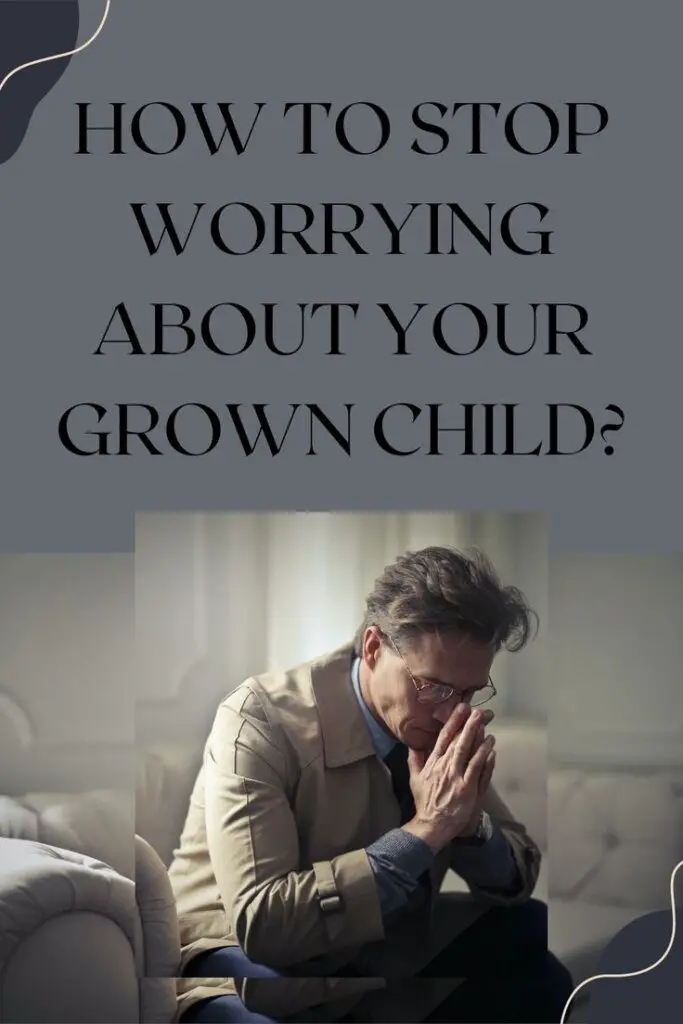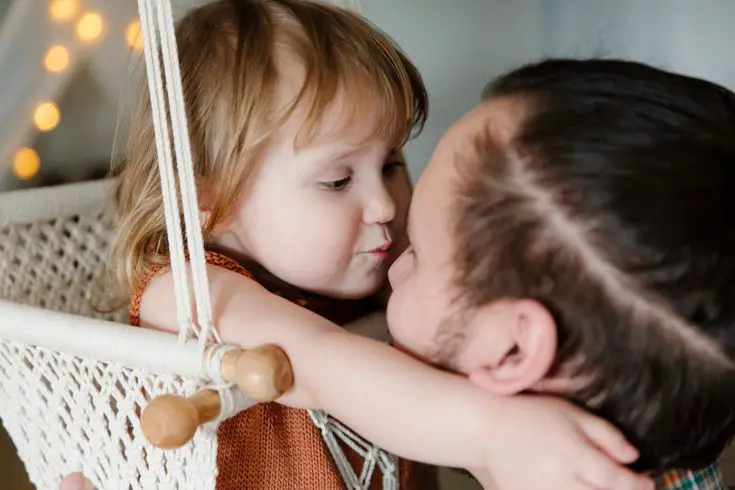Parenthood is a journey filled with ENDLESS love, care, and the continuous nurturing of your children. They hold a special place in your heart, from their very first breath to the day they leave home.
You put in endless hours guiding and looking out for them.
Yet, as they grow into young adults, a new challenge arises: the worry of letting go.
Switching from parenting a child to parenting an adult can be SCARY. The worries about their choices and happiness can keep you up at night.
Although it’s natural to worry because it demonstrates your love and affection, as a parent, you must learn the art of letting go while maintaining a loving and supportive relationship.
If you find yourself consumed by worrying for your grown child, pause, take a deep breath, and find your calm.
In this blog post, we’ll discuss “How to stop worrying about your grown child?”
So, let’s get started!


Why Do Parents Worry So Much?
Have you ever wondered why, as a parent, it’s so hard to let go of your grown child?
Of course you were!
Listen up! A STRONG CONNECTION formed between you and your little ones from the moment they were born.
This connection makes you protect and nurture your children throughout their lives.
Right?
Yet, there are multiple reasons that can trigger worry, even when your children have become independent adults.
Let’s discuss these reasons in detail!
Love and Attachment
Parents’ love for their children is super strong and lasts forever. It all begins when a baby is born and keeps getting stronger as time goes on.
The special connection formed during childhood sticks around and creates a strong bond between parents and their children.
This connection is all about
- Deep love
- Dedication, and
- A natural desire to look after them
This bond isn’t affected by time or age; it becomes stronger as they grow up.
When parents worry about how their grown-up kids are doing, it’s because of this love and attachment.
They only want what’s best for their children, and this love keeps driving them throughout their lives.


Fear of the Unknown
Many parents worry a lot about their grown-up children, mainly because they don’t know what to expect.
Each new stage of a child’s life brings new challenges, and parents often feel like they’re in new worries each time.
They often wonder whether they’re making the right choices for their child or not.
Starting from the early years, how to get them to sleep as babies, to deciding on their education when they’re older, all these uncertainties can be pretty stressful.
- As children become more independent and head towards adulthood, parents also wonder if they’ve prepared them well for the world out there.
- They ask themselves if they’ve taught them the right values and essential life skills.
- On top of all, the unpredictability of life adds to their concerns.
Parents want to make sure their kids can handle tough situations and make wise choices when things get uncertain.
Past Experiences
Parents often worry about their children, and sometimes, these worries come from their own life experiences – both good and bad.
If you have been through difficult times or have regrets from your past, you might end up being overly cautious.
You might try to keep your child away from problems, even if the situations are different from what you faced. Or you might fear that if your grown-up child makes mistakes or cannot manage on his own, it will reflect poorly on your parenting skills.
In short, you want to let the child face challenges independently, but you also want to protect them from any trouble.
How to Stop Worrying About Your Grown Child?
Worrying about your adult child is a natural and common concern for many parents.
However, excessive worrying can be unfavorable to both your own mental health and your relationship with your child.
So, it is essential to stop excessively worrying about your grown child.
Let’s discuss some simple ways you can do it easily!
Trust Their Decisions
Trusting your adult child to make the right decisions can produce a mix of comfort and concern.
It’s essential to understand that they are no longer children and can decide things based on their:
- Values
- Experiences
- Personal growth
Remember that they have learned from you, and their life experiences have shaped their ability to make decisions.
Therefore, it is important to TRUST their choices.
However, trusting them doesn’t mean turning a blind eye to potential problems.
Instead, encourage open communication and offer your perspective thoughtfully when asked for advice.
Express confidence in their ability to handle life’s challenges, and remind them that you are there to help no matter what.


Offer Advice Thoughtfully
Being a parent doesn’t mean your advice holds no value in your child’s life.
Instead, your life experience can offer valuable understandings that your adult child might truly appreciate.
But here’s the thing: the key to effective guidance lies in how you communicate.
When you want to offer guidance, take a moment to listen to their feelings and thoughts.
Demonstrate your understanding and genuine care.
Avoid imposing your ideas FORCEFULLY. Instead, ask open-ended questions that make them think about different aspects of a situation.
This approach builds TRUST and RESPECT, increasing the likelihood that your grown child will turn to you for guidance in the future.
Remember, it’s not just what you say but how you say can make all the difference.


Focus on Your Life
Focusing on your own life as a parent of a grown child means redirecting your attention and energy toward:
- Prioritizing your personal well-being
- Pursuing your interests
- Rekindling your aspirations
This shift is crucial for maintaining a healthy parent-child relationship.
It means refraining from GETTING OVERLY INVOLVED in their daily affairs, allowing both you and your child to lead fulfilling lives separately.
When you focus on your own life, you not only find greater happiness but also convey the importance of self-improvement and care to your child.
By finding a balance between your life and your child’s, you can be a supportive presence without becoming overbearing.
Respect Their Independence
Respecting your grown child’s independence is an essential aspect of nurturing a strong and healthy parent-child relationship.
It is imperative to understand that they have their own dreams, aspirations, and life paths to follow.
So, embrace and support their individual journey, even if it’s different from your initial expectations.
Respecting their independence also involves refraining from interfering in their personal affairs without permission. Avoid making assumptions about their life choices or invading their privacy.
Let them share their experiences with you willingly, creating an environment of trust and openness.
As you wholeheartedly value their independence completely, you will ultimately stop worrying about your grown child.
This mutual respect and trust will lay the foundation for a flourishing and enduring parent-child relationship.
Don’t Compare Them to Others
Comparing your adult child to others can be truly detrimental, affecting both your relationship with them and their overall well-being.
When you constantly judge your child’s achievements, behavior, or life choices against those of their friends or siblings, it can lead to anxiety for both you and your child.
Each person is unique, with their own strengths, weaknesses, and paths in life.
In this light, comparisons can hurt your child’s confidence, making them feel as though they must conform to someone else’s standards rather than chasing their own dreams.
As it is said,
“Don’t compare your child with others. There is no comparison between the sun and the moon. They shine when it’s their time.”
To nurture a healthy, flourishing relationship, shift your focus from comparisons to celebrating the unique qualities and aspirations of your child.
This shift allows both of you to TAKE PRIDE in one another’s company and encourages mutual growth.
NOTE: Your role is not to judge but to nurture, guide, and cherish your child for who they are – unique, special, and capable of their own remarkable journey.


Focus on the Present Moment
In the midst of worries and concerns about your grown child’s future, it’s all too EASY TO OVERLOOK the precious moments you share with them today.
Embrace these opportunities to create lasting memories, share HEARTY laughter, and engage in meaningful conversations.
When you choose to spend time with your adult child, make a DELIBERATE EFFORT to be fully present and attentive.
Set aside the distractions and give them the gift of your undivided attention. Just focus on the joy of being together and celebrate the remarkable person they have become.
By cherishing the present, you not only build an unbreakable bond but also can make happy memories for the future.
Talk with Other Parents
As a parent, it’s entirely easy to feel isolated when it comes to your worries and concerns about your grown child.
The journey of parenthood continues long after they’ve grown, and the challenges and uncertainties can often leave you feeling alone.
However, there is a powerful remedy to this isolation – reaching out to other parents who have experienced or are currently going through similar situations.
Consider becoming a part of your local parenting groups, engaging in online forums, or participating in informative workshops where parents openly share their experiences and insights.
By doing so, you not only break the chains of isolation but also open yourself up to a world of support and reassurance.
Connecting with other parents allows you to see things from different perspectives, learn from their experiences, and find comfort in knowing that you are not alone in your feelings.


FAQs
What Is Parents Worst Fear?
Economic insecurity is a common concern for parents regarding their grown children.
They worry about their child’s ability to financially support themselves, find stable employment, and secure a comfortable future.
This fear often stems from the unpredictable nature of the job market and the rising cost of living, leading parents to hope for their child’s financial stability and independence.
How Do I Stay Close to My Grown Son?
To stay close to your grown son,
- Maintain open communication and show interest in his life.
- Share your experiences and offer support when needed.
- Find common interests to bond over, and try to spend quality time together.
Doing so will definitely lead you to a stronger bond with your grown son.
How Do I Let Go of My Grown Child?
Letting go of a grown child involves recognizing their independence and encouraging open communication.
Encourage them to make their own decisions and offer support when needed. Trust in the foundation you’ve built and accept this new phase of your life.
If you really find it difficult to let go of your grown child, read this article: How Do I Let Go of My Grown Child? 7 Easy Ways!
That brings us to the end of our discussion. Now, let’s finalize our thoughts.
Conclusion
So, how to stop worrying about your grown child? I hope you can deal with your emotions now!
As parents, we love our grown children a lot, and we worry about them sometimes.
But it’s essential to find a balance between taking care of them and giving them room to grow.
You should trust their choices and focus on your own happiness, too.
This way, you are not only finding new hobbies and stopping worrying about your child but also teaching them that self-care is vital.
Let them be independent also helps you a lot in stopping worrying about them. To do so, just stop comparing them to others and enjoy your time together.
I hope this post helps you a lot. If you still have any query regarding this topic, you can mention it in the comment section below.


